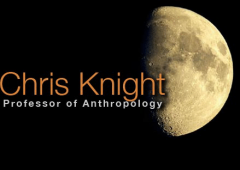Thesis submitted for the degree of Doctor of Philosophy University College London in 1987
Abstract
This thesis presents and tests a new theory of human cultural origins. The point of departure is an economic finding: unlike non-human primates when they engage in hunting, human hunters normatively do not eat their own kills. This apparent self-denial, it is argued, is best seen as an expression of a cultural universal, the sexual division of labour, in which women obtain meat which their sexual partners have secured. It is suggested that the female sex may have played a part in the establishment of this arrangement, and – in particular – that menstrual bleeding may have been central to its symbolic underpinnings.
In this context, a model of the “initial situation” for human culture is proposed. In this, menstrual bleeding is (a) socially synchronised and (b) marks a periodic feminine sexual withdrawal (in effect, a “sex-strike”) functioning to motivate and regularize male periodic hunting. On a symbolic level, menstrual blood is identified with the blood of game animals, a generalised avoidance of blood ensuring both a periodic separation of sexual partners (necessary for effective hunting) and the separation of hunters as consumers from their own kills (necessary to ensure economic circulation and exchange of the produce).
The body of the thesis takes the form of an extensive testing of this model. It is shown that it facilitates a much-simplified and internally coherent re-reading of Lévi-Strauss Mythologiques, in addition to much other recent writing on traditional mythology, cosmology, ritual and symbolism.
Download PDF 2.8MB
